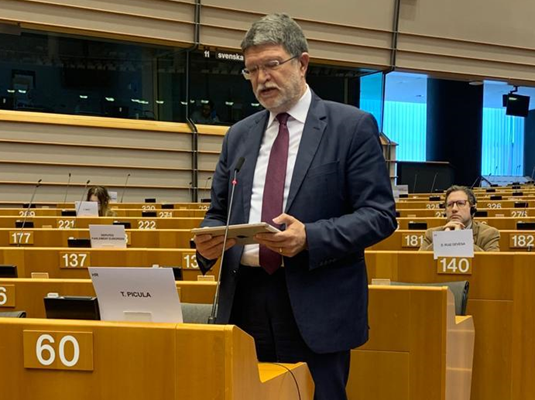Croatian MEP Tonino Picula spoke at a plenary session today convened to vote on urgent EU measures to combat the corona pandemic. These measures include support for health systems and financial assistance to the hardest hit Member States. The emergency package, worth 37 billion euros, aimes at reducing the effects of the pandemic on citizens' health and the economy.
Picula thanked everyone who worked around the clock on proposals so the European Parliament could discuss them today under such limited conditions. He stressed the first objective of this assistance must be to stop the spread of the virus and to protect the lives of citizens. He supported the allocation of 50 million EUR to the RescEU and the joint procurement of equipment, and 37.5 million EUR to European scientists working together to find a vaccine.
"When it comes to production of medicines and medical equipment, the new industrial strategy must ensure strategic autonomy because the EU is crucially dependent on imports," Picula stressed.
He estimated that the consequences of this crisis would be much greater than of the 2008 crisis. He therefore called for strengthening investment in social protection networks in order to mitigate the consequences for the most vulnerable groups.
“Special measures are needed for small, medium and micro enterprises – pillars of the European economy. As many as 95 percent of those in Croatia are already exposed to the effects of the crisis. The shutting down of the tourism sector this year will jeopardize budgetary sustainability of Member states such as Croatia whose quarter of the budget comes from tourism revenue. In addition, tourism connects other sectors such as transport and agriculture”, he recalled talking about Croatian and European companies and sectors. He further spoke of the need for urgent additional grants and reallocation of funds within the Fisheries Fund for the rescue of fisheries and aquaculture to ensure continuation of supply.
"The announcement of an extraordinary program for the purchase of 750 billion EUR common bonds and the activation of an additional 500 billion EUR from the European Stabilization Mechanism is encouraging. In particular, we need social measures to ensure minimum benefits for those who will run out of income. Guarantees should be given to anyone with a mortgage on the only property. Structural and cohesion funds will play a key role. They have always been a major source of public investment and a necessary tool for economic and social recovery", he added.
As the EP Rapporteur for enlargement in the Western Balkans and for Montenegro, he stressed that there is no comprehensive EU strategy for fighting the pandemic if the strategy does not include the Western Balkan countries. He therefore welcomed the decision of the Commission to approve a 38 million EUR package of direct assistance to health systems in the Western Balkans with a reallocation of 373 million EUR for social and economic recovery.
"It is important to provide financial assistance to countries that are geographically belonging to Europe and are surrounded by Member States. This is also a political message about the future of the enlargement process, which comes in the very week Northern Macedonia and Albania finally get approval to start negotiations", he said.
At the end, he thanked all the Member States who helped Croatia and Zagreb after the devastating earthquake last Sunday. "In the difficult times of dealing with the consequences of two crises at once, your solidarity is the best reminder of the common values of the Union - united in diversity, united in solidarity", Picula concluded.


